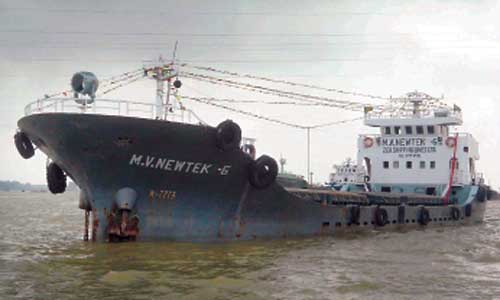NBR frames draft rules on transit with provision for revising fees
The National Board of Revenue has drafted the rules on customs management of transit and trans-shipment of goods under the Protocol on Inland Water Transit and Trade between Bangladesh and India, keeping a provision to revise transit and trans-shipment charge and other fees from time to time.
Arms, ammunition and explosives, nuclear and radioactive products, and toxic and pollutant products will not get transit and trans-shipment facility, according to the draft rules.
The draft rules also said that users of transit and trans-shipment facility will have to submit insurance coverage note with each challan (consignment) of goods to be transported under the facility from insurance companies registered and approved in Bangladesh.
Guarantee undertakings of the competent authorities of the country will also be acceptable if it is not possible for the users to collect insurance coverage note, the draft rules said.
The insurance must cover all the duties and taxes, which are supposed to be applicable for regular import of those goods, compensation for accident, negligence, any intentional damage and sabotage during transportation of goods.
The revenue board has drafted the rules after the government provided India with regular transit and trans-shipment facility at a very low transit fees of Tk 192.22 per tonne of goods from June 17 which generated huge criticism among people of the country.
A total of 1,004 tonnes of iron rod were transported through Ashuganj river port via Akhaura land port in Brahmanbaria to Tripura, a north-eastern state of India.
The rules will be finalised soon after holding meetings with shipping ministry and other stakeholders, officials of the NBR said.
According to the proposed rules, transit and trans-shipment goods will be allowed transport only in container, covered van, railway wagon and covered river vessels.
The transit goods will have to enter into Bangladesh through the customs stations fixed by the revenue board.
According to the proposed rules, transit and trans-shipment goods or commercially imported goods will be allowed to transport through Bangladesh separately in covered container, covered van, railway wagon and covered river vessels through the customs stations fixed by the revenue board.
Initially, the goods must be sealed by the source country to ensure security.
Bangladesh customs officials will re-seal the products at entry point if the seal of the source country is found secured and unbroken.
In case of trans-shipment, the goods to be transported through the container, covered van, covered truck or river vessels must be sealed with the unbroken seal which ensure the highest security while making trans-shipment arrangement at the entry point of Bangladesh.
Usually the sealed products will not be physically examined unless customs officials have information about transportation of prohibited goods.
In case of broken seal, the customs officials will conduct physical examination
of the product at exit points or other middle points by informing the importers.
They will take punitive measures including collecting taxes and duties if they found extra or less products against the declaration.
Transporter of the product will be held responsible if the seal is found broken and it will be a punishable offence as per law.
Relevant customs station will have to send detailed information of the transit or trans-shipment products to the exit point customs station in advance after shipment of the products.
Crews and sailors can bring their necessary products for daily use without duty-taxes. They have to give a declaration of the fuel oil of the vessel, spare parts and tools for repairing to the customs authority.
Importers should have to make declaration in import manifesto whether the goods are for transit or for trans-shipment.
News Courtesy: www.newagebd.net











